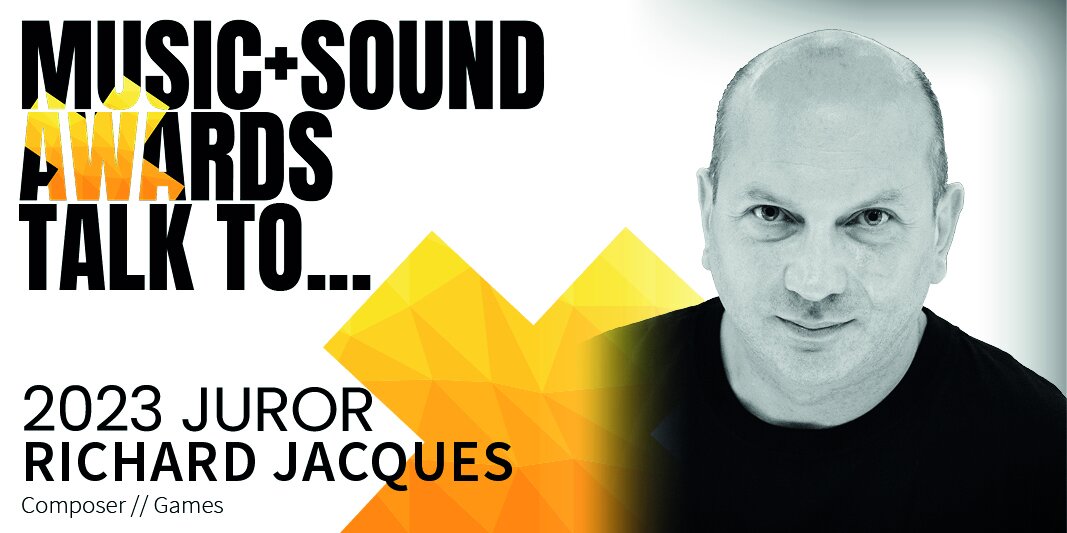June 2023
Classically trained at the Royal Academy of Music in London, Richard Jacques is an IVOR NOVELLO award-winning, GRAMMY® and BAFTA nominated composer for film, television and video games. He is renowned for his critically acclaimed orchestral scores for blockbuster franchises such as ‘Marvel’s Guardians of the Galaxy’, ‘James Bond 007: Blood Stone’, ‘Mass Effect’, ‘Overwatch 2’, ‘Starship Troopers’ and ‘Headhunter’.
We delve here into his background, creative process, and notable projects…
MASA: Can you tell us about your background as a composer and how you got started in the industry? Your work in video games is prolific. What initially attracted you to the medium?
RICHARD: I followed a traditional classical music education, studying as a Specialist Musician at Wells Cathedral School and the Royal Academy of Music, specialising in Composition and Music Technology as well as my instrumental studies on Trombone, Percussion and Piano. During my education I had a basic home studio where I became interested in composing and programming, making sounds and music on various home computers. It was also at this time that I was listening to hip hop and electronica, DJ’ing for various events, as well as playing in big bands and studying jazz. During the final year of my music degree, I saw an advertisement for an in-house Composer position with SEGA. After various rounds of interviews I was selected out of approximately 300 applicants and began my career literally 2 days after finishing my degree. I spent nearly 8 years with SEGA, creating soundtracks for many of their big IP’s, ending on a career high with my breakout score for “Headhunter”, which was the first video game in history to be recorded at Abbey Road Studios with a live orchestra. I became a freelance composer in 2001 and have since been fortunate to work with some of the best developers in the industry on many high profile titles. I was initially attracted to the medium because I always wanted to compose for the screen, to give an emotional backdrop to a strong narrative and characters, but working in an interactive / adaptive way. Composing interactive scores can be challenging and it is the challenges presented by the medium that I absolutely relish. Also, being a passionate gamer helps!
MASA: That’s an incredible journey, Richard. Now, tell us about your process for composing music for a video game. How do you approach capturing the essence and mood of a game through your compositions? What techniques or strategies do you employ to ensure that your music enhances the player's immersion and emotional connection with the game's narrative or gameplay?
RICHARD: The first thing I do is to completely immerse myself in various materials from the team. This can be anything including scripts, concept artwork, game design documents, PowerPoints, basically I live and breathe the available resources at the start of the process. I would then think about the music design. This is a crucial part of the process, making key decisions with the Audio Director regarding what we want to achieve creatively and how we would then achieve that from a technical standpoint. I would sometimes create some simple test music so I can implement it into the game at a very early stage, this would then give us the blueprints for the score. I would then look at the scope of the score, how much music is needed, when and where music is necessary and what function it is going to play. After this research / pre-production phase I would then start composing the score, identifying any strong musical themes since I would usually create these first. For the in-game score I would implement this into the game as I compose it, and then compose any cinematics towards the end of the process. Lastly, myself and my team would prepare the scores and parts for the recording sessions. After the recordings are complete we would mix the score and implement the final mixes into the game. I tend to approach each game differently, since games can vary greatly. Often I identify the narrative themes that the game will feature and then decide on my approach to these, as well as getting to know the backstory of the principal characters. Sometimes I would create musical themes for these narrative and character elements and sometimes I would take a more textural approach to a scene or location. The overall story arc is also something that I would keep in mind whilst composing.
MASA: You were nominated this year for a Grammy for your work on "Marvel's Guardians Of The Galaxy”. Huge congratulations! It would be wonderful to hear a little about your experience on the game.
RICHARD: It was a huge privilege to be nominated for a Grammy, especially since this was the first year of this category and also because I was the only non L.A. based composer. What a fantastic experience it was! I had such a great time scoring Marvel’s Guardians Of The Galaxy, it was the perfect project for me and incredibly well suited to my style. Also, being a Marvel fan myself helped frame my approach to the score. I approached the project with a very strong main theme for the Guardians, that would be flexible enough to work in different situations throughout the game. The game itself has an incredible story, which covers key themes such as a sense of loss and hope, and the importance of feeling accepted. So there are some very poignant moments in the game as well as the high-octane action sequences, which gave me the opportunity to weave my score throughout the narrative arc of the game. Player choice is a big part of the game, so there are many optional conversations that you may have with characters you meet along the way. All of these are branching storylines with many, many options, each of which needed scoring to match the correct mood and dialogue, so there was a huge amount of music in the game. The score is also interactive, changing and adapting to whatever the player is doing on screen, ensuring that the music is a seamless experience for the player. I also got the opportunity to write some diegetic music when the player visits “Knowhere”. This ranges from Alien Techno, to Industrial, and even a Spaghetti Western bar fight! I also utilized choir and various choral effects for a couple of the key protagonists. It was great fun writing lyrics based on Kree, and also creating guttural whispering and chants for various points in the story. It was such a wonderful experience scoring Marvel’s Guardians Of The Galaxy, one that is definitely a career highlight.
MASA: Such outstanding work. Could you share some examples of other memorable projects you've worked on? Some highlights and challenges?
RICHARD: In 2010 I scored “James Bond 007: Blood Stone”, which was a wonderful opportunity. As I had studied jazz extensively, and also being a trombone player, this gave me the perfect foundation for taking on a Bond score. I was fortunate enough to be able to work with all the musicians who play on the movies, and the results were spectacular. One of the challenges was the use of The James Bond Theme (Monty Norman). Even though we licensed the music, which I then re-recorded, we were only allowed to use it on the title screen of the game. It was therefore a challenge to ensure that the score sounded sufficiently “Bond”! Luckily I brought my passion for action music to the score and it definitely ticked all of the right boxes! I also really enjoyed working on Little Big Planet: The Muppets, where I got the chance to score for big band, which was a superb experience.
MASA: What role does collaboration play in your work as a video game composer? How do you work with developers, sound designers, and other members of the game development team to create a cohesive audio experience?
RICHARD: I collaborate very closely with members of the development team, especially with the Audio Director, and all of the sound team, but also with the narrative, combat / gameplay and cinematics teams. It is a crucial part of the development process to discuss the musical design and approach to implementation, especially when a game involves a huge amount of dialogue and often weapon sounds. I would always work closely with the sound designers to ensure that my choice of instrumentation and approach to orchestration works well with the sound design and dialogue elements. Regarding cinematics, I work with the cinematics team closely especially regarding edits / shot lengths, and ensuring there is a seamless transition between gameplay and cinematics.
MASA: Video game technology is constantly evolving. How do you stay up-to-date with new tools, techniques, and trends in game audio production, and how do you adapt your approach accordingly?
RICHARD: I have always been keeping in touch with technology since I was very young, and ensure I keep myself fully informed and up-to-date through reading magazines, mailing lists / social media groups, conferences, and discussing technology and approaches to technology with my peers. When a new console is announced I’m always eager to hear about the audio systems that are being developed and I always relish the prospect of pushing the boundaries further. I would often make some changes in my studio to ensure I am ready to cater for any of these changes, for example with surround sound mixing and production, or various tools to ensure a smooth pipeline for a specific project. I always treat technology as an enabler, and have a ‘just because you can doesn’t mean you always should’ kind of approach, meaning that the overall music aesthetic is always at the forefront of my mind.
MASA: How do you approach creating a signature sound or theme for a game, particularly for iconic characters or franchises? How do you balance the expectations of fans while bringing something fresh and unique to the table?
RICHARD: Working with iconic franchises and characters is a real joy for any composer. I try to be respectful to any music that has come before (such as James Bond for example), whilst injecting my signature sound of action scoring and strong themes to the project. Current trends could also play a part, depending on the nature of the franchise, and I also think about orchestration / instrumentation and production techniques that I may wish to employ. I work hard to make all of my scores unique to each specific project, even if the subject material or characters may already exist.
MASA: And lastly, what will you be looking for when judging? What makes a piece of work worthy of a Music+Sound Award?
RICHARD: I will be looking for originality, quality of composition, competence of orchestration / arrangement, choices of instruments / sounds, style, implementation, and overall how well the music fits the game and enhances the player experience.




